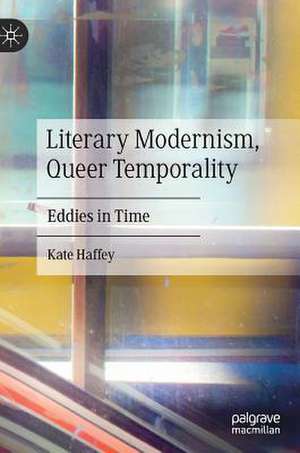Literary Modernism, Queer Temporality: Eddies in Time
Autor Kate Haffeyen Limba Engleză Hardback – 8 mai 2019
Preț: 573.44 lei
Preț vechi: 674.64 lei
-15% Nou
Puncte Express: 860
Preț estimativ în valută:
109.78€ • 114.11$ • 91.02£
109.78€ • 114.11$ • 91.02£
Carte tipărită la comandă
Livrare economică 06-20 februarie 25
Preluare comenzi: 021 569.72.76
Specificații
ISBN-13: 9783030173005
ISBN-10: 3030173003
Pagini: 200
Ilustrații: XI, 205 p. 1 illus.
Dimensiuni: 148 x 210 mm
Greutate: 0.45 kg
Ediția:1st ed. 2019
Editura: Springer International Publishing
Colecția Palgrave Macmillan
Locul publicării:Cham, Switzerland
ISBN-10: 3030173003
Pagini: 200
Ilustrații: XI, 205 p. 1 illus.
Dimensiuni: 148 x 210 mm
Greutate: 0.45 kg
Ediția:1st ed. 2019
Editura: Springer International Publishing
Colecția Palgrave Macmillan
Locul publicării:Cham, Switzerland
Cuprins
1. Introduction: Queer Moments and Eddies in Time.- 2. Exquisite Moments and the Temporality of the Kiss in Mrs. Dalloway and The Hours.- 3. “Still and Moving”: Winterson, Eliot, and the Dance in Time.- 4. Telling Queer Tales: Narration and Genealogical Time in William Faulkner and Angela Carter.- 5. “Pure Child”: The Temporality of Childishness in Sedgwick and Stein.- 6. Conclusion: Figuring the Future: Queer Time in Contemporary Literature.
Notă biografică
Kate Haffey is Associate Professor of English in the Department of English, Linguistics, and Communication at the University of Mary Washington, USA. Her work focuses on twentieth-century literature and queer theory.
Textul de pe ultima copertă
This book explores the intersection between the recent work on queer temporality and the experiments of literary modernism. Kate Haffey argues that queer theory’s recent work on time owes a debt to modernist authors who developed new ways of representing temporality in their texts. By reading a series of early twentieth-century literary texts from modernists like Woolf, Eliot, Faulkner, and Stein alongside contemporary authors, this book examines the way in which modernist writers challenged narrative conventions of time in ways that both illuminate and foreshadow current scholarship on queer temporality. In her analyses of contemporary novelists and critics Michael Cunningham, Jeanette Winterson, Angela Carter, and Eve Sedgwick, Haffey also shows that these modernist temporalities have been reconfigured by contemporary authors to develop new approaches to futurity.
Caracteristici
Advances scholarship of literary modernism and narrative studies Applies queer temporality to modernist literature Explores the ways in which modernist writers challenged narrative conventions
